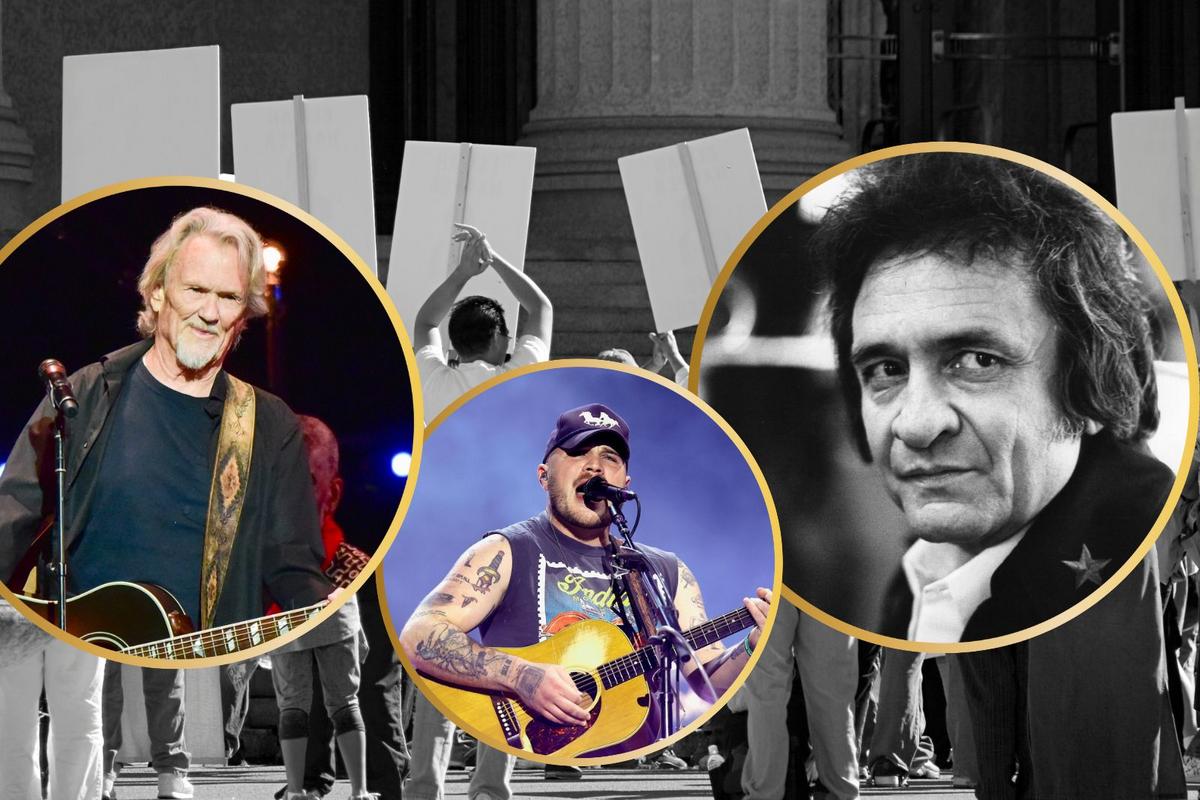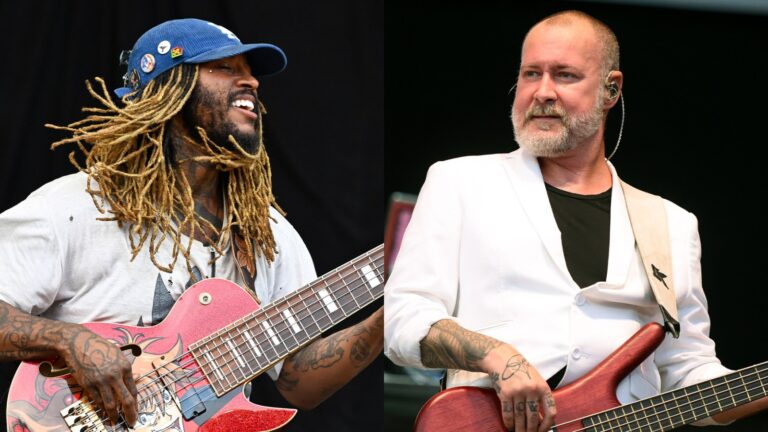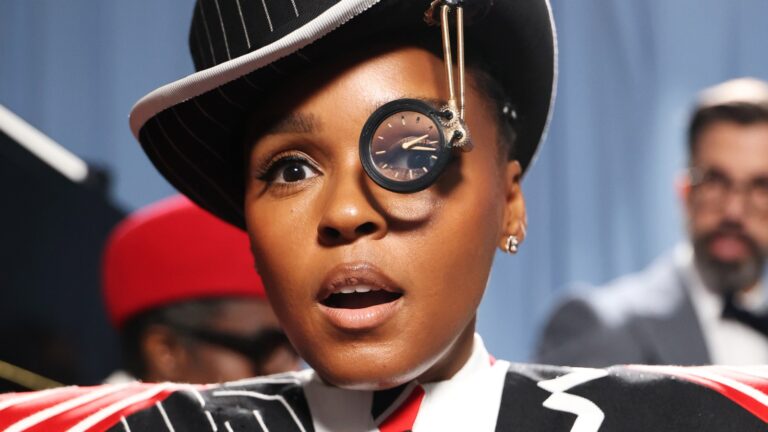If you think the Department of Homeland Security was right to tell Zach Bryan he should “stick to ‘Pink Skies'” after he criticized ICE in a new song, you might want to check your country music history.
“Shut up and sing” is a familiar sentiment for any country star who’s expressed a political viewpoint publicly.
Read More: Why Does Zach Bryan Have Beef With the U.S. Government?
But if you look back at country music over the years, country music has always had stars who spoke out against the U.S. government, the establishment and the status quo.
Protest is part of the artistic imperative, and there have always been country singers who contributed to the American protest music songbook.
If anything, country music’s protest songs — at least, on the left-leaning side of things — have gotten tamer over the years.
The Rise of the Alt-Right in Country Music
Historically, many of country music’s biggest stars have demurred when asked about politics.
Dolly Parton is the classic example: She has consistently rebuffed interviewers’ questions about her political views throughout her seven-decade-long career.
But, especially since U.S. president Donald Trump was first elected in 2016, many country stars have become more candid about their conservative leanings.
Jason Aldean is the leader of that pack. He and his wife Brittany have become more and more vocal about their right-wing views and their support of Trump.
Aldean performed during Trump’s 2024 inauguration ceremonies, but that’s not all: He’s also been golfing with the president, and has his personal phone number.
Read More: Nate Smith Shares Conservative Politics: ‘This Is No Longer the Time to Be Afraid’
RaeLynn has also ramped up her conservative viewpoints along the same timeline. Most recently, Nate Smith came out as a Trump supporter, reintroducing himself to his fans as someone who loves Jesus, conservative values and America.
Justin Moore, John Rich, Aaron Lewis and Kid Rock are a handful of other proudly conservative stars.
To a lesser extent, the uptick in espousing political views has been true on the other side of the aisle. Maren Morris became increasingly vocal about her left-leaning viewpoints in the years before she distanced herself from the genre in 2023.
And in October 2025, there’s one rising star who’s so far to the left, we’re not sure the last time we’ve seen someone who looks and sounds so mainstream talk about the issues he brings up to a country audience. (Scroll down to No. 7 on this list for more about him.)
What Kind of Protest Songs Have Country Artists Released?
The 1970s were a hotbed of political expression in country music, with artists including Kris Kristofferson, John Prine and Johnny Cash delivering anti-establishment lyrics stronger than most of today’s country stars would dare to sing on a record.
Loretta Lynn and Dolly Parton sang powerful anthems for women’s rights in the workforce and in claiming reproductive freedom.
Steve Earle, the Chicks and Jason Isbell are among those who have criticized U.S. involvement in various wars and armed conflicts.
And artists including Aaron Lewis, Hank Williams, Jr., Oliver Anthony, Jason Aldean and Merle Haggard have all recorded take-downs of government overreach, championing the traditionally country values of living rurally, with minimal involvement or oversight from the federal government.
Read More: The Most Politically Outspoken Country Singers
Tennessee Ernie Ford and Patty Loveless are two more great singer-songwriters who’ve focused specifically on worker’s rights issues like union disputes and the exploitation of the poor.
But the anti-ICE lyrics in Bryan’s “The Fading of the Red, White and Blue” speak negatively about the police — a rarer topic for country music to take on.
What Are Some Country Songs About the Police?
Although country music has a long history of taking on topics related to the working class, as well as women’s rights issues, the genre also has a pretty well-deserved reputation of being pro-cop.
George Strait‘s “The Weight of the Badge” and Reba McEntire and Faith Hill‘s “Sleeping With the Telephone” are just two of the many country songs that touch on the risk police officers take when they step into uniform and work to defend their communities.
But there are also a surprising number of songs that criticize the police — typically for instances of police brutality, or racial profiling.
Some of these songs date back decades, and other were released within the past few years. But no matter when they came out, they speak to country music’s powerful tradition of free speech, even when the topic of that speech might go against many listeners’ political beliefs.
Keep reading for a roundup of some of the most impactful anti-police country songs in the genre’s history.
1. Zach Bryan, “The Fading of the Red, White and Blue”
Bryan’s song is the newest on this list — in fact, he hasn’t even dropped the whole thing yet!
But even with just one portion of the song out as a teaser, it’s certainly caused some commotion. That one little lyric about how “ICE is gonna come and bust down your door” spawned blowback from Homeland Security Secretary Kristi Noem, White House spokesperson Abigail Jackson and more.
Read More: Why is Zach Bryan Beefing With the U.S. Government?
From his reaction to the negative attention, it seems like Bryan wasn’t necessarily trying to take a strong stance against the police in his song. He said he was “embarrassed” and “kind of scared” by the response, and said that listeners will get a more balanced picture once the whole song drops.
He also assured fans that he’s not on either of the two “radical sides.” Bryan hasn’t espoused politics much in the past, though he did serve in the Navy and frequently shares patriotic beliefs.
2. Waylon Jennings, “Don’t You Think This Outlaw Bit’s Done Got Out of Hand”
Jennings criticizes the police from the very first lyric in this song.
“I’m for law and order the way that it should be / This song’s about the night they spent protecting you from me,” he sings.
He was inspired to write “Don’t You Think This Outlaw Bit” in the late ’70s, after a drug bust at his studio while he was recording his 1978 I’ve Always Been Crazy album. Jennings was arrested by DEA agents and charged with drug possession, though those charges were later dropped.
In the song, Jennings wonders if he would have been targeted if his reputation for being an outlaw country singer weren’t so pronounced. It’s also easy to read this song as a criticism of police for focusing on drug-related arrest over more pressing, dangerous crimes.
3. Johnny Cash, “The Ballad of Ira Hayes”
Johnny Cash’s 1964 rendition of “The Ballad of Ira Hayes” is the most popular version, but this song has been recorded by many artists across country, rock and folk.
It tells the true story of Ira Hayes, who was one of six Marines who famously hoisted the U.S. flag on Mount Suribachi during the Battle of Iwo Jima in World War II.
Hayes was a member of the Pima Native American tribe who enlisted in the U.S. Marines in 1942 and was discharged a hero in 1945. But Hayes struggled to re-adapt to civilian life, and fought alcoholism up until his death in 1955, when he was just 32 years old.
“The Ballad of Ira Hayes” criticizes the U.S.’ treatment of military veterans, saying that despite some performative appreciation for Hayes “like you’d throw a dog a bone,” he was overlooked and frequently jailed in the years between his discharge and his death.
The lyrics also condemned white settlers’ treatment of the Pima Native American people, with lyrics about how they “stole their water rights” and left the community hungry and unable to grow their own food.
4. Tyler Childers, “Long Violent History”
One of the newer songs on this list, Tyler Childers’ “Long Violent History” is the title track of an album the singer put out in 2020.
That project is mostly a collection of traditional fiddle tunes, and by contrast, this song might feel jarringly out of place. It’s a comment on the Black Lives Matter movement and the police killings of minorities that were playing out across the U.S. that year.
But bringing the two together — traditional Appalachian music and a current political message — was no accident.
Childers wrote this song as a message to rural Appalachian listeners who condemned the looting and property damage they saw on the news in association with BLM demonstrations.
Childers lays it on ’em like this: What if it were members of the Appalachian community, and not predominantly Black people in cities, who were being targeted and killed by the cops?
“How many boys could they haul off this mountain / Shoot full of holes, cuffed and layin’ in the streets / ‘Til we come into town in a stark raving anger / Looking for answers and armed to the teeth?” he posits.
In other words, would a poor, white rural community in West Virginia or Kentucky — a group of people who themselves have historically been the victims of government oppression, albeit of a different kind — allow police to systemically profile, unfairly arrest and even kill members of their community, just because of the way they looked?
And if they’d fight that injustice, how could they condemn the Black communities for doing the same?
5. J.J. Cale, “If You’re Ever in Oklahoma”
J.J. Cale’s 1972 release “If You’re Ever in Oklahoma” is a warning, plain and simple.
The song cautions travelers to steer clear of the cops when they’re passing through the Sooner State because “They got fines and they got plenty” and “They’ll hold you up for days on end / Threaten your life and take your money.”
Doesn’t get much clearer than that.
6. Kris Kristofferson, “The Law is for Protection of the People”
Here’s another song whose writer seems to find some irony in the whole “Protect & Serve” idea.
In Kris Kristofferson‘s thorny 1970 takedown of the police, he describes just a handful of some of the people that the cops might take off the street in order to keep the community safe.
Among them are a drunk, a hippie — and Jesus Christ himself. Yep, the tongue-in-cheek element of the song gets more and more obvious as “The Law is for Protection of the People” goes on.
7. Bryan Andrews, “The Older I Get”
It’s not all that rare for artists who fall under the country umbrella to espouse leftist politics.
But it’s pretty much unheard of for a modern country artist who looks and sounds so mainstream to go this scorched earth.
In October 2025, a new-to-country-listeners singer named Bryan Andrews is going TikTok-viral over a song called “The Older I Get,” whose lyrics condemn — among other things — the genocide in Gaza, the vote to block the release of the Epstein list, ICE deportations, capitalism and more.
Andrews doesn’t just sing about his views; he talks about them, too.
Take a look at his Instagram page and you’ll see a sight that’s pretty familiar to country listeners — a redneck-looking guy in a ball cap, talking to a camera in his truck — but if you hit unmute, you’ll hear him calling out the cops, the U.S. government and much more.
8. John Prine, “Your Flag Decal Won’t Get You Into Heaven Anymore”
This song is technically more about empty patriotism than it is about the cops, but it just doesn’t feel right to make a list of anti-protest songs without something by John Prine.
Prine showed his gift for mixing wit with sharp cultural criticism throughout his career, but nowhere else did he sum it up more succinctly.
The narrator in “Your Flag Decal Won’t Get You Into Heaven Anymore” just can’t stop piling American flags onto his car. But when he sticks so many onto the dash that he can’t see and dies in a car accident, he makes it up to Heaven only to discover that he’s not getting in.
“We’re already overcrowded from your dirty little war,” the man standing at the Pearly Gates says at the end of the song.
9. Maren Morris, “Better Than We Found It”
Maren Morris released this song in 2023, not long before she distanced herself from the country genre — in part because she felt so displaced from its political and cultural narratives.
In one verse, Morris specifically critiques the police for doing more harm than good to many of the community members they’re enlisted to protect.
“Over and under and above the law / My neighbor’s in danger, who does he call?” Morris sings. “When the wolf’s at the door all covered with blue / Shouldn’t we try something new?“
Morris wrote the song out of a wish for a better world for her young son, and as a response to the police killings of minorities and Black Lives Matter protests that took place across the nation in 2020.
See 50 Essential ’70s Country Songs
Gallery Credit: Billy Dukes



